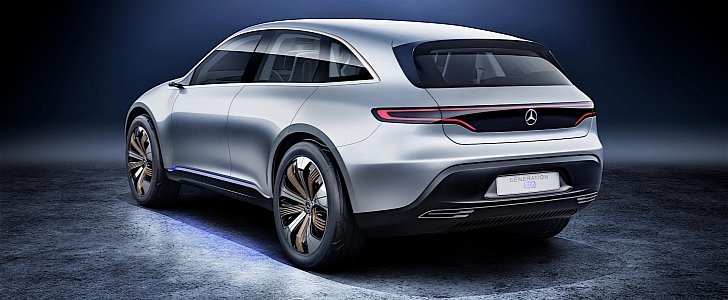Mercedes-Benz has planned a line of electric models named EQ, which will be a sub-brand with a separate design from the rest of the portfolio.
With the evident intention of selling more electric vehicles, some people wondered if Mercedes-Benz will continue to develop hydrogen fuel cell vehicles. Before launching a few production EVs, the three-pointed star brand offered FCVs through leasing for clients in selected markets.
Those vehicles were used as test beds to understand how a regular client would use the technology, but they were not developed into production spec automobiles because they would have been too expensive to sell to the average Jane or Joe.
Instead, the German conglomerate decided to focus on improving the fuel economy of its internal combustion engines, along with offering more electric cars in the portfolio.
Meanwhile, Toyota has launched the world’s first production hydrogen car, the Mirai. It was followed by Honda, which offered a comparable car, but with limited availability in some markets. Evidently, the roll-out of hydrogen fuel cell vehicles is slow, mostly because the infrastructure required to refill them is a bit more complicated than the one needed for EVs.
However, the German premium brand still believes in the technology, Ola Kallenius explained. The head of the research and development department told Digital Trends that the next-generation of the FCV technology from the brand would be revealed during the second half of this year.
The GLC will get a variant of it in 2018, but the automaker does not expect significant volumes in the short-to-mid term for this type of propulsion system. Eventually, the EQ range will get hydrogen fueled models, but electric technology will be a priority for many years.
Hydrogen needs to be stored in specialized tanks, which operate at a high pressure, and the refueling process is done with dedicated pumps that ensure a perfect seal between them and the tank. The primary benefit of hydrogen technology is a quick refuel time, which is almost as fast as a conventionally-fueled automobile.
Another advantage of hydrogen fuel cell cars is the elimination of the requirement to develop a charging infrastructure for electric vehicles, and the possible use of energy from unsustainable sources.
Unfortunately, just like an electric automobile, you cannot refuel a hydrogen fuel cell car on the go without the utilization of another vehicle that is specially equipped for the job.
Hydrogen fuel requires special tanks to operate, and they need to be made safe in the case of a severe impact, while also being lightweight and durable enough to be practical for many years of use.
Those vehicles were used as test beds to understand how a regular client would use the technology, but they were not developed into production spec automobiles because they would have been too expensive to sell to the average Jane or Joe.
Instead, the German conglomerate decided to focus on improving the fuel economy of its internal combustion engines, along with offering more electric cars in the portfolio.
Meanwhile, Toyota has launched the world’s first production hydrogen car, the Mirai. It was followed by Honda, which offered a comparable car, but with limited availability in some markets. Evidently, the roll-out of hydrogen fuel cell vehicles is slow, mostly because the infrastructure required to refill them is a bit more complicated than the one needed for EVs.
However, the German premium brand still believes in the technology, Ola Kallenius explained. The head of the research and development department told Digital Trends that the next-generation of the FCV technology from the brand would be revealed during the second half of this year.
The GLC will get a variant of it in 2018, but the automaker does not expect significant volumes in the short-to-mid term for this type of propulsion system. Eventually, the EQ range will get hydrogen fueled models, but electric technology will be a priority for many years.
Hydrogen needs to be stored in specialized tanks, which operate at a high pressure, and the refueling process is done with dedicated pumps that ensure a perfect seal between them and the tank. The primary benefit of hydrogen technology is a quick refuel time, which is almost as fast as a conventionally-fueled automobile.
Another advantage of hydrogen fuel cell cars is the elimination of the requirement to develop a charging infrastructure for electric vehicles, and the possible use of energy from unsustainable sources.
Unfortunately, just like an electric automobile, you cannot refuel a hydrogen fuel cell car on the go without the utilization of another vehicle that is specially equipped for the job.
Hydrogen fuel requires special tanks to operate, and they need to be made safe in the case of a severe impact, while also being lightweight and durable enough to be practical for many years of use.

